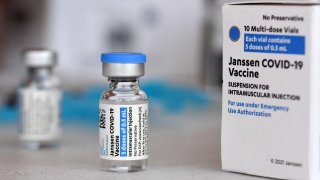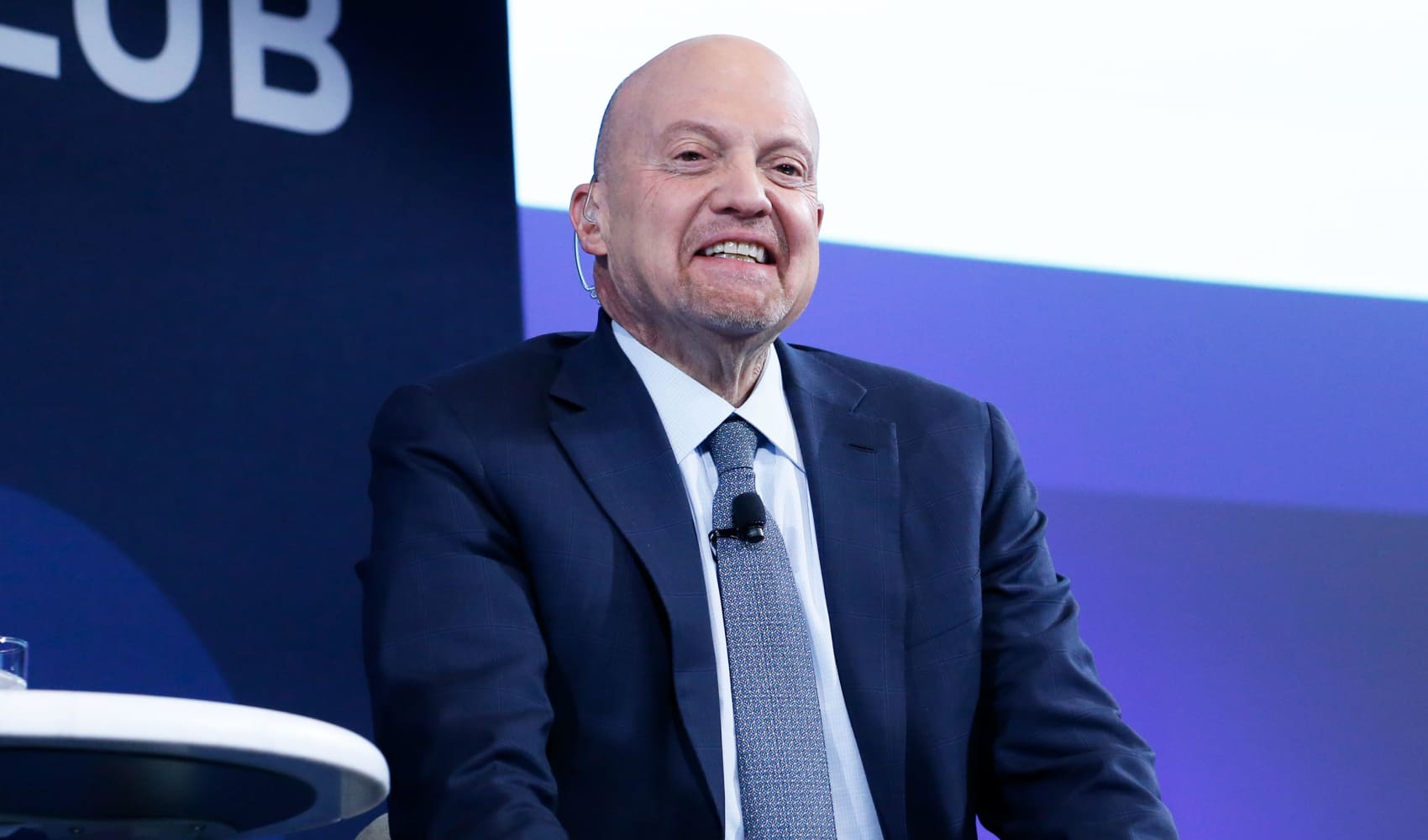
This was CNBC's live blog covering the FDA's Vaccines and Related Biological Products Advisory Committee meeting Friday to debate and vote on booster shots for Johnson & Johnson's Covid vaccine. This blog will be updated throughout the day as the news breaks.
The Food and Drug Administration's key vaccine advisory panel met Friday to discuss and vote on Johnson & Johnson's Covid-19 booster shots and to debate mix-and-match vaccines. The group unanimously recommended extra shots of J&J for everyone 18 and older who originally received the jabs.
On Thursday, the Vaccines and Related Biological Products Advisory Committee recommended the use of Moderna's booster shots to people 65 and over and other at-risk groups.
Ahead of the meeting, the FDA staff told the committee there may be a benefit to administering a second dose of J&J's vaccine two months after the first shot. They also said one J&J dose was consistently less effective than the mRNA vaccines made by Pfizer and Moderna in clinical trials and in real-world studies.
Get Boston local news, weather forecasts, lifestyle and entertainment stories to your inbox. Sign up for NBC Boston’s newsletters.
J&J's booster doesn't work as well as Moderna or Pfizer
J&J's Covid booster produces weaker protection than extra doses of Pfizer and Moderna's vaccines, according to a National Institutes of Health study that looked at mixing and matching the three different shots.
Money Report
NIH researchers studied about 450 vaccine recipients to determine the safety and effectiveness of combining vaccines from alternate manufacturers. Though recipients of all three vaccines demonstrated a surge in antibodies after receiving J&J's booster, Pfizer and Moderna's boosters generally produced a higher degree of protection, said Dr. Kirsten Lyke from the University of Maryland.
"Following the Janssen boost, we do see evidence of increase in neutralizing antibodies across the board," Lyke said of J&J's extra dose. "But again, there appears to be a 7- to 10-fold increase in the mRNAs as compared to the Janssen homologous prime boost."
— Robert Towey
FDA begins debating mix-and-match Covid vaccines
The FDA's vaccine advisory panel turned its attention Friday to mix-and-match Covid booster doses after unanimously voting to endorse additional jabs of J&J's shots.
The National Institutes of Health released data earlier this week showing that J&J's Covid-19 vaccine recipients are better off getting a booster shot from Pfizer or Moderna, a highly anticipated U.S. study suggested Wednesday.
The NIH study on "mixing and matching" Covid vaccines included more than 450 adults who have received one of the three regimens currently available in the United States: J&J's, Moderna's or Pfizer's. The study, which looks at whether there are any advantages or drawbacks to using different boosters, hasn't yet been peer-reviewed.
— Dawn Kopecki
FDA panel endorses J&J Covid booster shots
A panel of outside experts said the FDA should authorize J&J's Covid booster shots, voting unanimously Friday to recommend an extra dose to all adults who already got the company's vaccine.
The advisory committee said the agency should consider administering a second shot at least two months after people receive the first shot.
J&J's shots, which weren't authorized in the country until late February, aren't as effective or popular as Moderna and Pfizer's vaccines are in the U.S. Almost 104 million people have been fully vaccinated with Pfizer's vaccine compared with more than 69 million who've gotten Moderna and just 15 million Americans who were jabbed with J&J's shot.
The panel wrapped up its debate unusually early, voting on the booster shots around 1:30 p.m. ET.
Scientists press FDA on speed of J&J review
Members of the FDA's advisory committee questioned the speed with which the agency is reviewing J&J's Covid booster data.
"Is there an option of saying it's a little early? There are a number of issues that are still outstanding," committee member Dr. Cody Meissner asked FDA officials. "There are a lot of uncertainties at this point, making it hard to vote for or against this tonight."
Dr. Peter Marks, director of the FDA's center for biologics evaluation and research, asked that the panel move forward with the meeting and address any members' outstanding concerns at the end.
"I would suggest we work our way through the process, go through the questions, and if at the end of the day the feeling of the committee is that this is not ready, I think we can have some comments after that would go along the lines of what could be done to make this acceptable in the future," Marks said.
— Robert Towey
FDA says small trial of J&J boosters showed no new side effects
Participants in a J&J trial for Covid boosters administered six months after the primary dose experienced no new adverse side effects, FDA medical officer Dr. Timothy Brennan told the agency's advisory committee.
Though the trial's sample size of 17 participants ages 18 to 55 prevented Brennan from drawing any conclusions on the data, he noted that there appeared to be a trend toward lower rates of adverse reactions following the booster dose compared to after the primary dose.
Of the 17 participants, roughly 47% reported headache symptoms, 26% reported fatigue and 21% reported myalgia, or muscle pain, after receiving a J&J booster.
— Robert Towey
FDA panel asks J&J why boost at six months
Dr. Hayley Gans, a voting member on the committee, asked J&J what the rationale was for offering a second dose of the vaccine at two months or six months.
Johan Van Hoof, J&J's global head of infectious diseases and vaccines, said there is a better immune response from the vaccine when given six months after the second dose. However, a second dose after two months may be better for those at high risk, such as the elderly, who need extra protection immediately.
"When the vaccine is given six months after the first dose versus two months, the titers are potentially much higher than when you give that" at two months, he said.
–Berkeley Lovelace Jr.
No increased risk of blood clots after second dose, J&J says
There is no data to suggest people are at increased risk of a rare, but serious, blood clot condition after receiving a second dose of J&J's vaccine, executives told the committee.
Dr. Macaya Douoguih, head of clinical development and medical affairs for J&J's vaccines division Janssen, presented data from the U.K. on second doses of AstraZeneca's vaccine, which uses a similar platform to J&J's. The data shows the rate of vaccine-induced immune thrombotic thrombocytopenia, or VITT, after a second dose was less frequent than the first.
"Although the vectors are not entirely the same, the data may provide some insight into potential risk," Douoguih said.
–Berkeley Lovelace Jr.
J&J scientists tell FDA boosting at six months provides stronger protection than at two months
Dr. Johan Van Hoof, the global therapeutic area head for J&J's Janssen vaccine division, told the panel that boosters administered six months after the primary dose resulted in a 12-fold increase in antibodies.
The company's data is based on a group of 17 participants ages 18 to 55. A larger study of 51 trial participants saw a nearly 5-fold increase in antibodies from a J&J booster given two months after the first dose.
Administering boosters after six months also yielded a proportional increase in the vaccine's effectiveness against Covid variants, including the highly transmissible delta strain, Van Hoof said.
— Robert Towey
FDA proposes voting questions for J&J boosters
The FDA proposed the committee vote on two main questions concerning J&J's Covid boosters, which will guide debate for the day. Dr. Peter Marks, the agency's top vaccine regulator, suggested the panel consider whether there is enough data to justify authorizing an extra shot to people 18 and over either two months after the first dose or six months.
The vote is scheduled to take place before 3:15 p.m. ET.
–Berkeley Lovealce Jr.






